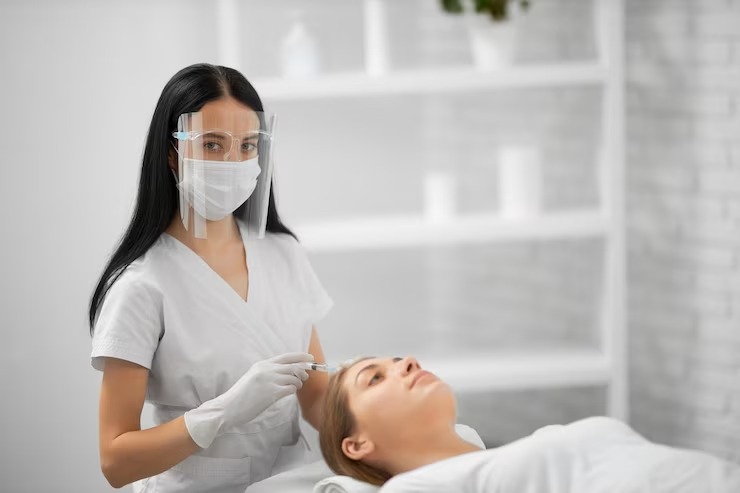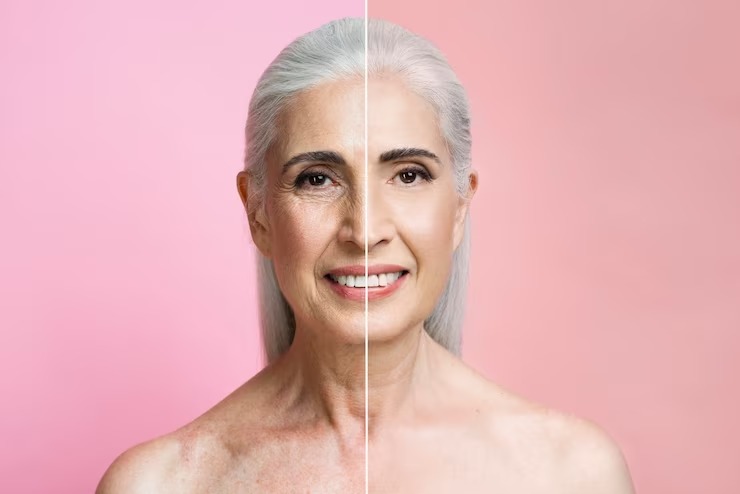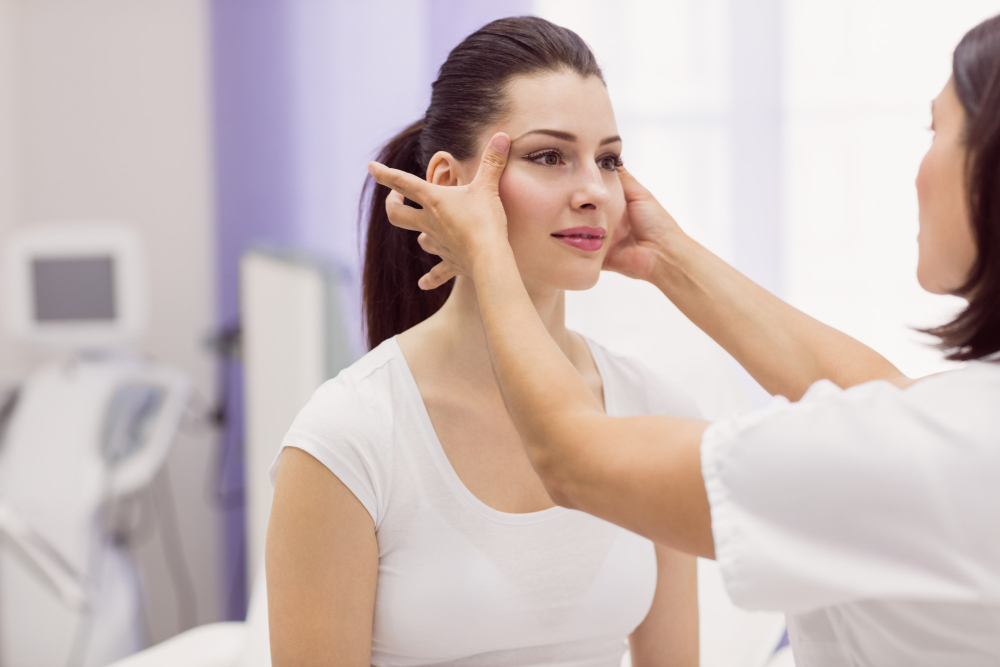Best Peptides for Skin

Various skincare ingredients have taken the beauty industry by storm in the quest for youthful, radiant skin. Among these, peptides and hyaluronic acid have emerged as popular and practical choices. Peptides, tiny chains of amino acids, are crucial for maintaining the skin’s health and appearance, including the integrity of the skin barrier. Some peptides even act as enzyme inhibitors, preventing the breakdown of important proteins like collagen. Additionally, hyaluronic acid, combined with ingredients like vitamin C, provides powerful hydration, moisture retention, and a plumping effect to the skin, promoting a more youthful and revitalized complexion.
This article, we will explore the world of peptides for the skin, understand the wonders of copper these peptides work, and uncover their numerous benefits.
Understanding Peptides and Their Role in Skin Health
Specific proteins, peptides, and building blocks are essential components for maintaining healthy and youthful skin. These naturally occurring substances play a crucial role in collagen synthesis, wound healing, and cellular communication. However, as we age, the production of peptides in our skin diminishes, resulting in noticeable signs of aging. To combat this, it is advisable to include skincare products enriched with specific peptides that can replenish and stimulate the natural peptide levels in the skin, promoting a more youthful appearance.
What are the best peptides for skin care?
Several peptides are commonly used in skincare products due to their potential anti aging benefits for the skin. Here are some of the best peptides for the skin:
1. Matrixyl peptides for skin:
Matrixyl, also known as palmitoyl pentapeptide-4, is a peptide that helps stimulate collagen production and smooth skin, improving flexibility of skin and reducing wrinkles’ appearance.
2. Argireline peptides for skin:
Argireline, or acetyl hexapeptide-8, is called “botox in a jar.” It works by relaxing facial muscles, which can help reduce the appearance of fine lines and wrinkles.
3. Copper peptides for skin:
Copper peptides combine copper with a peptide molecule. They are known to promote collagen synthesis, improve skin flexibility, and have antioxidant properties that can protect the skin from free radical damage.
4. Palmitoyl Tripeptide-1:
This peptide stimulates collagen synthesis and helps to improve the skin’s texture and firmness. It can also help reduce the appearance of fine lines and wrinkles.
5. Palmitoyl Tetrapeptide-7:
This peptide is known for its anti-inflammatory properties. It can help calm the skin, reduce redness, and improve the other topical skin care products complexion penetrating skin’s overall appearance.
6. Palmitoyl Oligopeptide:
This peptide stimulates the production of collagen and elastin, which can lead to firmer skin and more youthful-looking skin. It also has moisturizing properties that help keep the skin hydrated.
It’s important to note that individual results may vary, and the effectiveness of peptides can depend on factors such as concentration, formulation, and individual skin type. It’s always a good idea to consult a dermatologist or skincare professional before incorporating peptides into your skincare routine.
What do peptides do for the skin?
Peptides play a significant role in skincare due to their numerous benefits. Here are some of the advantages of using peptides in skincare products:
1. Anti-Aging Properties:

Peptides have the potential to stimulate increase collagen production in the skin. Collagen is a protein that provides structure and firmness to the skin. As we age, collagen synthesis in aging skin decreases, leading to wrinkles and fine lines. By promoting collagen synthesis, peptides can help reduce the signs of premature aging, and improve the skin’s structure and elasticity.
2. Skin Tightening and Healing:

Specific peptides possess injury-healing properties, making them beneficial for repairing damaged skin. They can help accelerate the skin’s natural healing process and improve the appearance of scars, blemishes, and sun damage.
3. Moisturization and Hydration:

Peptides can enhance the skin’s ability to retain moisture. They can form a protective barrier on the skin surface, preventing moisture loss and improving skin barrier function and overall hydration. This can result in softer, smoother, and more supple skin.
4. Antioxidant Effects:
Some peptides exhibit antioxidant properties, which can help protect the skin against free radicals. Free radicals are unstable molecules that can damage skin cells and accelerate aging. By neutralizing these harmful molecules, peptides contribute to maintaining healthier and younger-looking skin.
5. Skin Brightening and Even Tone:

Certain peptides have been found to inhibit melanin production, the pigment responsible for dark spots and uneven skin tone. By regulating melanin production, peptides can promote a more even complexion, clean skin and reduce the appearance of hyperpigmentation.
6. Reduced Inflammation:
Peptides with anti-inflammatory properties can soothe and calm the skin. They can help alleviate redness, irritation, and sensitivity, making them beneficial for sensitive or reactive skin.
Side effects of peptides:
Some potential side effects of using peptides in skincare products may include:
1. Skin irritation:
Like any active ingredient, peptides can sometimes cause skin irritation, redness, itching, or a burning sensation. This is more likely if you have sensitive skin or the product is used incorrectly or excessively.
2. Allergic reactions:
Although rare, some individuals may be allergic to certain peptides or other ingredients in skincare products. Signs of an allergic reaction can include hives, rash, swelling, or difficulty breathing. If you experience these symptoms, discontinue use and seek medical attention.
3. Acne breakouts:
Certain peptides, particularly those that stimulate collagen synthesis, may cause temporary acne breakouts or clogged pores in some individuals. This can be attributed to the increased cell turnover and can usually be resolved by adjusting product usage or discontinuing the use not all peptides if the issue persists.
4. Sensitivity to sunlight:
Some peptides, particularly those with copper or other metals, may increase photosensitivity in some individuals. Using sunscreen and limiting sun exposure when using such products is recommended.
The Power of Peptides in Reducing Wrinkles and Fine Lines
Peptides have gained significant attention for their anti-aging properties. When applied topically, peptides can penetrate the skin’s surface and reach the deeper layers, penetrating the skin itself, promoting more collagen in production and stimulating cell turnover. This process helps diminish the appearance of wrinkles and fine lines, revealing smoother and more youthful-looking skin.
Boosting Collagen and Elastin Levels for Improved Muscle Contraction and Skin Health
Collagen and elastin are essential proteins for healthy skin and muscle function. To support collagen elastin production, it is important to adopt certain habits. Regular exercise, a balanced diet rich in protein, vitamin C, and antioxidants, along with proper hydration, can promote collagen synthesis. Additionally, incorporating collagen-boosting skincare products and avoiding excessive sun exposure can help maintain youthful and elastic skin. Embracing these practices will aid in improving collagen synthesis, benefiting both contraction of the muscles and skin health.
Conclusion
Peptides have revolutionized the skincare industry, offering a natural and effective solution for achieving youthful, radiant skin. With their ability to stimulate collagen production, improve skin texture, and address various skin concerns, peptides have become a go-to ingredient for individuals seeking a comprehensive anti-aging regimen. Embrace the power of peptides and unlock the secrets to ageless beauty.
FAQs (Frequently Asked Questions)
Q1: Are peptides good for the skin?
Yes, peptides are beneficial for the skin. They are short chains of amino acids that can help improve skin elasticity, firmness, and hydration. Peptides stimulate collagen production and promote hyaluronic acid synthesis, which enhances skin moisture retention. Overall, peptides effectively nourish and rejuvenate the skin, making them a valuable ingredient in skincare products.
Q2: Which peptides are best for the skin?
Some of the best peptides for the skin include palmitoyl pentapeptide-4 (Matrixyl), GHK-Cu, acetyl hexapeptide-8 (Argireline), and palmitoyl tripeptide-1 and palmitoyl tetrapeptide-7 (Matrixyl 3000). These collagen peptides have been researched and shown to offer benefits such as collagen stimulation, injury healing promotion, improved collagen synthesis, muscle relaxation, and improved skin firmness.
Q3: Why are peptides good for the skin?
Peptides are suitable for the skin because they interact with skin cells and provide various advantages in skin care. They can stimulate and increase collagen synthesis, which improves skin elasticity and reduces wrinkles. Peptides can also promote skin repair and healing, provide antioxidant protection, and enhance moisturization, leading to healthier, more youthful-looking skin.
Q4: Are peptides suitable for all skin types?
Peptides are generally suitable for all skin types. They have multifaceted benefits such as firming and hydrating the skin, plumping sagging skin, and promoting a plumper appearance. Peptides can be especially beneficial for dry skin as they help to replenish moisture and improve hydration levels. However, it is always recommended to perform a patch test before using any new skincare product to ensure compatibility with individual skin sensitivities.
Q5: Are peptides safe to use during pregnancy?
While peptides are generally safe, it is always best to consult your healthcare provider before introducing new skincare products during pregnancy.
Q6: What is the best peptide to tighten skin?
The best peptide for tightening skin is Argireline (acetyl hexapeptide-8). It works by inhibiting muscle contractions, reducing the appearance of wrinkles and fine stripes, and promoting firmer, tighter skin.
Q7: Is peptide good for the skin?
Yes, peptides are commonly used in skin care products and are known for their potential benefits for the skin. Peptides are short chains of amino acids, which are the building blocks of proteins. They can help improve the appearance and health of the skin in various ways.
Q8: Which peptides stimulate collagen?
Peptide such as palmitoyl pentapeptide-4 and copper peptides are known to stimulate collagen synthesis. These peptides promote collagen synthesis, promote collagen production, improve the stretch of the skin, and reduce the appearance of wrinkles. Their application can help boost collagen levels and enhance overall skin health and appearance.
